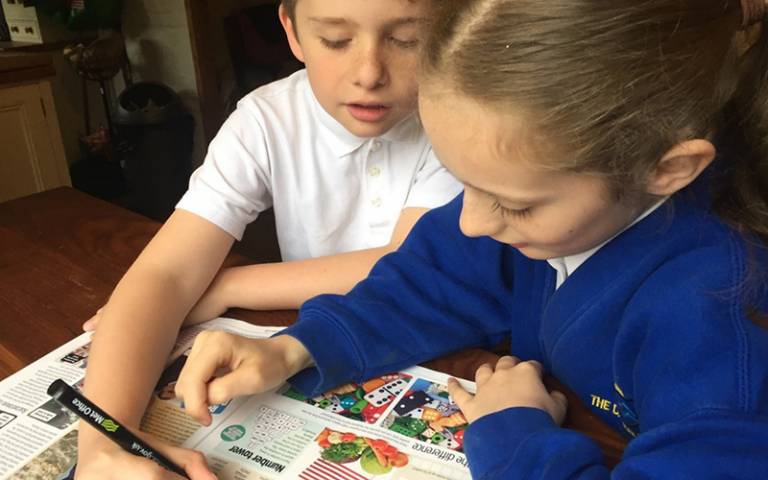A longitudinal study of 'low ability' grouping.

A study into how primary school pupils experience being members of the 'bottom ability' group, investigating links between personal and social flourishing and learning, and factors that influence their experiences.
- Overview
Children are not often asked to voice their true opinions at school - especially not about school - despite findings that primary school pupils could voice valuable insights into their own classroom experiences.
For pupils in 'bottom' groups, ability grouping appears to have detrimental effects on their learning. Alongside decreased attainment, insights from pupils in these groups show that some express a sense of being treated as different, and less worthy, by their teachers. They may also perceive that other pupils look down on them, which undermines their confidence and can make them feel unhappy. Jack, a 9-year-old pupil, explained:
" I thought I was okay but it turned out I wasn't. I tried my hardest and now I just had to move down [to the 'lowest ability' group]. People have laughed at me every day for two weeks."
This project seeks to unravel the personal and social aspects of the pupil's experience, and to investigate the complexity of how they come about and subsequently impact pupils' learning.
- Background
'Ability' grouping was justified by the Labour government in the 1990s who claimed that grouping advanced pupils' 'motivation, social skills, independence' because students in ability groups became 'more engaged in their own learning' (DfES, 2005, p.58).
Pupils in 'bottom' groups
As a result, almost 80% of pupils are now 'ability'-grouped for most or all subjects. Yet for pupils in 'bottom' groups, ability grouping appears to have the opposite effects to those stated by government.
'Low ability' criteria
The concept of innate 'ability' has proved more complex than it was first portrayed: criteria for being labelled as 'low ability' sometimes appear to involve factors such as social class or language rather than attainment. Despite this, the commonly accepted view that 'ability' grouping is both necessary and normal still persists.
Unsatisfactory teaching conditions
Some reasons for the negative effects of low 'ability' groups seem to originate in unsatisfactory teaching conditions in those groups. Relatedly, 'bottom' group pupils seem to experience reduced levels of motivation and aspiration; a poorer sense of belonging; and general feelings of unhappiness or anger. In addition, they make less progress than their peers according to national tests.
- Aim of the project
Until now, research conducted on this issue only points to general trends. This project aims to improve the sophistication of our knowledge about how 'ability' grouping functions by drawing on the perspective of primary school pupils.
School-life histories
Through constructing a set of school-life histories, the project aims to investigate and challenge the accepted 'truths' that:
- 'ability' is a fixed, quantifiable and innate property of the child, and
- teaching pupils in groups defined by this 'ability' is beneficial for their learning and personal and social flourishing.
Pupils' experience over five years
Extensive, regular interviews and classroom observations will detail individual pupils' experience over five years. A particular area of investigation will be into whether, and if so how, effects snowball across the five years.
- Timescale and outputs
312 observations and interviews will be conducted over 13 terms, culminating in the pupils' last term of Year 7 in secondary school. Each pupil's experiences will be monitored in English and mathematics, as well as in art and physical education (PE).
Timescale
- April 2018: start of the research project with a team of three researchers at IOE.
- June 2018: first round of data collection begins with a selection of 24 children, consisting of six Year 3 pupils in each of the four participant schools.
Outputs
Journal articles
- Threats to creative learning in the primary-school: energies diverted into performative orientations - 24 Jul 2023Cambridge Journal of EducationTaylor & Francis. Co-authors: Hargreaves E, Buchanan D, Quick L
- Supports for survival in school for ‘lower-attaining’ children: how an Autonomous Orientation to learning can help - 22 Dec 2023Education 3-13Informa UK Limited. Co-authors: Buchanan D, Hargreaves E, Quick L
- National Curriculum and Assessment in England and the continuing narrowed experiences of lower-attainers in primary schools - 2 Sep 2023 Journal of Curriculum StudiesInforma UK Limited. Co-authors: Hargreaves E, Quick L, Buchanan D
- Sense of competence, autonomy and relatedness during primary-secondary transition: children express their own experiences - 28 Dec 2022 International Journal of Educational and Life Transitions. Co-authors: Hargreaves E, Saville K, Buchanan DENISE et al.
- Life-history research with children: Extending and enriching the approach - 27 Dec 2021 Children and SocietyWiley-Blackwell. Co-authorsP: Hargreaves E
- Persevering for a cruel and cynical fiction? The experiences of the 'low achievers' in primary schooling - 22 Nov 2021 British Journal of Educational StudiesTaylor & Francis. Co-authors: Hargreaves E, Buchanan D, Quick L
- Parity of participation? Primary-school children reflect critically on being successful during schooling- 16 Mar 2021 Oxford Review of EducationTaylor & Francis. Co-authors: Hargreaves E, Quick L, Buchanan D
- “Look at them! They all have friends and not me”: the role of peer relationships in schooling from the perspective of primary children designated as ‘lower-attaining’ - 16 Feb 2021 Educational ReviewTaylor & Francis. Co-authorsP: Hargreaves E, Buchanan D, Quick L
- Team
- Dr Eleanore Hargreaves, Principle Investigator (PI)
- Denise Buchanan, Research Assistant
- Laura Quick, PhD student
Latest news
 Close
Close


